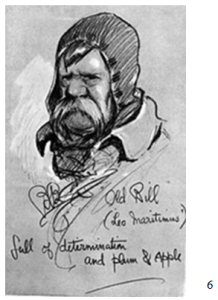Thursday, June 10, 1915
Trenches, Givenchy
The Battalion War Diarist wrote for this day: “Relieved late in the afternoon by 3rd Battn. (Lt.-Col. Rennie) and marched to billets in Bethune, on north bank of canal, arriving at 8:30 p.m.” [1]

THIS DAY IN RMR HISTORY: “Captain (Charles) Bruce Bairnsfather (9 July 1887 – 29 September 1959) was a prominent British humorist and cartoonist. His best-known cartoon character is ‘Old Bill.’ Bill and his pals Bert and Alf featured in Bairnsfather’s weekly ‘Fragments from France’ cartoons published weekly in ‘The Bystander’ magazine during the First World War.

In 1914 he [Bairnsfather] joined the Royal Warwickshire Regiment as a second lieutenant and served with a machine gun unit in France until 1915, when he was hospitalised with shellshock and hearing damage sustained during the Second Battle of Ypres. Posted to the 34th Division headquarters on Salisbury Plain, he developed his humorous series for the Bystander about life in the trenches, featuring “Old Bill”, a curmudgeonly soldier with trademark walrus moustache and balaclava. The best remembered of these shows Bill with another trooper in a muddy shell hole with shells whizzing all around. The other trooper is grumbling and Bill advises:
Many of his cartoons from this period were collected in Fragments From France (1914) and the autobiographical Bullets & Billets (1916). Despite the immense popularity with the troops and massive sales increase for the Bystander, initially there were objections to the “vulgar caricature”. Nevertheless, their success in raising morale led to Bairnsfather’s promotion and receipt of a War Office appointment to draw similar cartoons for other Allies forces.” [4]
“Old Bill was depicted as an elderly, pipe-smoking British “tommy” with a walrus moustache. The character achieved a great deal of popularity during World War I where it was considered a major morale booster for the British troops. Old Bill and his younger troop-mate little Alphie were private infantrymen in the British Expeditionary Force.
Many claims have been put forth as being the model for ‘Old Bill’ but the most likely appears to be Thomas Henry Rafferty, a lance corporal from Birmingham in Bairnsfather’s regiment, the Royal Warwickshires, who was killed in the same action that invalided Bairnsfather in April 1915. Rafferty was featured in the Weekly Dispatch in 1917, referred to as ‘Old Bill,’ along with a photograph taken by Bairnsfather.” [7]
[1] War Diary, 14th Canadian Battalion, The Royal Montreal Regiment, June 10, 1915. Library and Archives Canada, Ottawa http://data2.collectionscanada.ca/e/e044/e001089758.jpg
[2] Wikipedia contributors, "Bruce Bairnsfather," Wikipedia, The Free Encyclopedia, http://en.wikipedia.org/w/index.php?title=Bruce_Bairnsfather&oldid=649113961 (accessed March 7, 2015).
[3] http://theshakespeareblog.com/wp-content/uploads/2013/03/better-ole.jpg
[4] Wikipedia contributors, "Bruce Bairnsfather," Wikipedia, The Free Encyclopedia, http://en.wikipedia.org/w/index.php?title=Bruce_Bairnsfather&oldid=649113961 (accessed March 7, 2015).
[5] http://upload.wikimedia.org/wikipedia/en/e/ec/OldBill.jpg
[6] http://upload.wikimedia.org/wikipedia/commons/0/08/-Old_Bill-,_by_Bruce_Bairnsfather.jpg
[7] Wikipedia contributors, "Old Bill (comics)," Wikipedia, The Free Encyclopedia, http://en.wikipedia.org/w/index.php?title=Old_Bill_(comics)&oldid=638944714 (accessed March 7, 2015).



